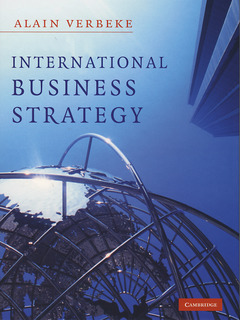Description
International Business Strategy
Rethinking the Foundations of Global Corporate Success
Author: Verbeke Alain
Language: English
Subject for International Business Strategy:
International business strategy
Publication date: 01-2009
506 p. · 19.3x25.3 cm · Hardback
Out of Print
Publication date: 01-2009
506 p. · 19.3x25.3 cm · Hardback
Out of Print
International business strategy (Paper)
Publication date: 01-2009
499 p. · 18.9x24.7 cm · Paperback
Replaced by new edition: Access to the new edition.
Publication date: 01-2009
499 p. · 18.9x24.7 cm · Paperback
Replaced by new edition: Access to the new edition.
Description
/li>Contents
/li>Biography
/li>
How can you best extend your knowledge of how multinational enterprises (MNEs) function? What does globalization mean for today's managers? How do students turn the message from academic literature into effective business strategies within an MNE? This practical textbook shows how the key concepts from business strategy literature can be applied to multinational enterprise. MBA and Masters students will gain the practical knowledge and skills needed to succeed as effective managers in multinational companies through a critical study of mainstream strategy models and the analysis of forty-five key journal articles. More than twenty 'half-length' case studies from leading firms including Honda, IKEA and Danone show globalization in practice at the firm level. The book also Identifies seven central themes from the literature for successful global strategies and unifies them into a clear framework that can be applied to real businesses worldwide.
Introduction; Part I. Core Concepts: 1. Conceptual foundations of international business strategy; 2. The critical role of firm-specific advantages; 3. The nature of home country location advantages; 4. The problem with host country location advantages; 5. Combining firm-specific advantages and location advantages in an MNE network; Part II. Functional Issues: 6. International innovation; 7. International sourcing and production; 8. International finance; 9. International human resource management; 10. International marketing; Part III. Dynamics of Global Strategy: 11. Entry mode dynamics 1: foreign distributors; 12. Entry mode dynamics 2: strategic alliance partners; 13. Entry mode dynamics 3: merger partners; 14. The role of emerging economies; 15a. International strategies of corporate social responsibility; 15b. International strategies of environmental sustainability; Conclusion: the true foundations of global corporate success; Appendix: suggested additional readings.
Alain Verbeke holds the McCaig Research Chair in Management at the Haskayne School of Business, University of Calgary. He was previously the director of the MBA programme at Solvay Business School, University of Brussels (VUB). Professor Verbeke is an elected fellow of the Academy of International Business and has authored or edited 23 books and more than 160 refereed publications.
© 2024 LAVOISIER S.A.S.




